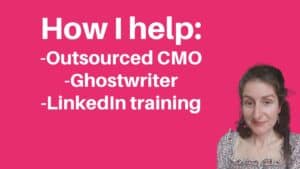Podcast: Play in new window | Download
Almost every time I do something weird with my business to the point that anyone I tell laughs at it, those are the times of my highest effectiveness. If I were a financial advisor wanting to grow my business, I would do it weird as hell. Niched down like hell. This blog talks about target markets for financial advisors and we’re going to discuss four examples of wild, wacky niches that have turned out to be simply brilliant for the advisors brave enough to venture forth.
But first…

For those of you who are new to my blog/podcast, my name is Sara. I am a CFA® charterholder and financial advisor marketing consultant. I have a weekly newsletter in which I talk about financial advisor lead generation topics which is best described as “fun and irreverent.” So please subscribe!
Financial advisor target markets
What is a target market for a financial advisor?
A financial advisor’s target market is a group of people who share a set of common characteristics. There is usually one predominant trait that defines the categorization of the group. This is also called a “niche.”
Electing to market to a specific group of people means that you must give up the idea of being able to hold yourself out as a solution for everyone. However in exchange, you reap the benefit of being perceived as a higher value financial advisor by the target market’s members.
You want the person who finds you to say: “This person is ‘so me.’ They know more than I do about the financial implications of being a part of my little corner of the world than I do.” That, in a nutshell, is how a financial advisor’s value proposition can be radically strengthened by a focus on a target niche.
Weird, wacky niches for financial advisors
It’s common for financial advisors to work exclusively with physicians, business owners, women, executives, etc. But those financial advisor target markets are so crowded! What if we turned up the resolution on the magnifying glass by 1000% though, and niched down even more granularly?
Wouldn’t it be highly rare for a financial advisor to become an expert in every aspect of life for one of the following groups:
- Psychic mediums
- Celebrity personal trainers
- Luxury car dealership owners
- Research scientists who work in Antarctica intermittently
- Pool cleaning company owners (also a good COI, by the way)
- Strippers
- BMX bikers
- Gamers
- Stunt actors
- Sky divers
People retort back, “But none of these groups have any money?”
Guess what – you only need 50-70 good clients to make a business out of. So you’re going to tell me that within the entire United States, there aren’t 50 stunt actors that are making six figures, and who have been able to accumulate some dough?
Meshugana!
By the way, niches are great for your SEO. You can use certain targeted keyphrases to drive traffic to your website from your niche! Example: a keyword phrase could be “financial advisor for sky divers”
Use these SEO tips from Neil Patel to optimize your blogs and website.
How’s this for a financial advisor niche?
I had Michael Kitces on my podcast a few years ago and he told me this cool story of a weird, wacky financial advisor niche market.
There’s a guy in the Midwest. His niche is bass fishermen. Not all fishermen – because that would be too broad, right – just bass fishermen. He grew up on a lake. He’s been involved in a bass fishing community… I didn’t know until I learned about his story but bass fishing apparently – million dollar prize purses for the big tournaments. Then the endorsement deals roll in. So there’s a ton of money that moves around the bass fishing community, but he’s “the guy.” He knows the community, he knows the issues, he knows how the prize purses work, he knows how the endorsement deals work. He’s “the person.” And so that’s his niche and that’s his thing. It sounds kind of absurd but he’s now like 38 years old, he manages $120MM and 90% of his clients are bass fishermen.
-Michael Kitces
What makes a good niche?
These are the traits to look for when establishing a financial advisor target market:
- Active online community
- Some type of thing they need to have to be qualified
- Rich people that are transparently rich; you can tell if they’re rich
- A group of other professionals who serve them and have this as a niche exclusively
- Some way of congregating (conferences, online groups, etc) with more than 20k people online or 3k people in person
- Good search volume – 100 or more searches on
- Clear problems that are specific to that niche
- Some degree of openness to outsiders (if you are an outsider; if not, even better you’ll automatically be accepted)
- Publications they read that somebody outside the niche would not read
- Something you are somewhat passionate about yourself (this makes it easier)
- People you can empathize with and not judge
Now let’s talk about some financial advisor target market stories.
Todd Keffury
Todd Keffury of Cadenza Financial Planning is a financial advisor who lives in Las Vegas and is focused on working with event planning professionals.
How did you pick this niche market?
My wife is a live event producer, so I have insight into the industry. We travel extensively as a result, so I get to meet a lot of folks that way. And it dovetails nicely with the fact that I’ve set my biz up as a virtual financial planning firm, so I can work with clients across the country.
What research did you do, and what were the signs that it would be a good target market for a financial advisor?
A lot of professionals in this industry work as freelancers. But I’ve found relatively few who have structured themselves tax-efficiently. On top of that, freelancers generally have to wear many hats and are more amenable to delegating responsibilities outside of their professional expertise…and most neither know how to nor have the time to wear the “financial planner” hat.
The convergence was really between my first-hand experience as a freelancer, my personal connection with the industry, and the feasibility of offering fee-only financial planning to a segment of the population with little to no investable assets that has traditionally been ignored.
How are you getting COIs involved?
I work with a few advisors who are bound to the AUM model. When they come across prospects with little in the way of investments, they can feel good about referring to me as a fee-only resource for planning.
More substantial, however, have been referrals from the clients with whom I work. People are accustomed to the exclusive nature of “financial planning” either through past experience or through the ads they see that invite them to engage if they have over $500,000 of investable assets. This exclusivity has alienated the majority of the population who DON’T have those resources, but still need planning. When my clients refer, they are referring from their personal experience, the results, and the efficacy of our work together.
What are the advantages and disadvantages of focusing on a target market this way?
Advantages: Marketing becomes less about throwing darts than it does about building a finite network and focusing on issues that are relevant to that network.
Disadvantages: A lot of time and energy building a fairly targeted universe of prospects.
Do you think it has made it harder or easier to grow a business by focusing this way?
In the short term, harder. But the thought is that, long-term, the benefits will be worth it, and I’ll be working with a clientele I enjoy serving.
What do you do when you meet someone who wants to work with you, but who isn’t in the niche?
I will work with anyone for whom planning is worth the money they spend to engage. One of the best parts of this job is variety, and for the 10 years I’ve been doing planning, I’ve thrived on the variety and depth you can dig into if you’re ready to do the work.
If you had to do it over again, would you do anything differently?
Nope.
Aaron Shapira
Aaron Shapira is a financial advisor focused on working with NRI (non resident Indians that have US visas) in the tech space. (Apple, Amazon, Nvidia, Facebook, etc.).
How did you pick this niche market?
I had a several friends who were from my college that were international students, primarily from India. They went on to big tech companies and had F1 visa and H1B down the road. So I had to learn how to navigate that and became pretty good with how to plan for people with an international background. From there it was the realization of how much potential a lot of these prospects have. I have found that a lot of the prospects I work with that have visas are very bright and move up the ladder quickly, mostly because the only way they got an American company to sponsor their work visa was because they were really talented.
What research did you do, and what were the signs that it would be a good target market for a financial advisor?
From a cultural perspective, I found that a lot of the NRI (non resident Indian) clients I worked with initially were big savers, very planning focused, and incredibly high potential. I also found that they were remarkably underserved, most advisors are turning away non US citizens or super inexperienced with working with them and understanding their needs. One of the best ways to gain market share is to do things differently than everyone else, so I figured being in a niche that is not popular would be best.
How are you getting COIs involved?
I have my current clients alongside friends that are COIs and advocates for my practice. They really built the foundation for what my practice is today. It’s quite easy to prospect and get referrals from NRI clients, they almost always know people that are just like them of whom could really appreciate the connection.
What are the advantages and disadvantages of focusing on a target market this way?
The big advantages on this market is the fact that a lot of them are net savers that have high potential. The tech space is great since there are RSU, ESPP etc that we can help clients plan around. They also have unique needs when it comes to disability insurance to protect their H1B visa.
The harder part of this market though is understanding how different their priorities are from your standard clientele. A lot of them have an obligation to send a large portion of their paycheck to their family back home rather than save for their future. Others are used to the Indian financial system and preferences, and so they might be putting all their money in real estate, gold, or CDs. There is often uncertainty as well on whether they stay/retire in the states or back home.
Do you think it has made it harder or easier to grow a business by focusing this way?
It has been much easier growing my business by having this focus, both from a quality and quantity standpoint. Most opportunities are much larger since these professionals are highly compensated, and they are an underserved segment of the population so there is a ton of demand.
How do I find the right niche for my financial advisor practice?
OM gosh I am so glad one of you asked me this…
…because I am sick to death of you financial advisors all trying to stalk and harass high-earning physicians into being your clients!
There is more than one profitable niche, okay? Here’s how to find one that works for you.
#1
Analyze your client base. If you have more than three clients with a similar distinguishing feature, you may already have the kernel of a niche.
#2
Identify the strongest body of knowledge you have.
Example: retirement plans for S Corp owners
#3
Or, identify a strong urge that you have to fix something that is wrong with the world.
Example: financial planning for refugees
#4
Find a group that desperately needs this knowledge and:
- Is able to be accessed in volume and with frequency
- Ideally reachable over the internet (social media, email newsletter, etc.)
- Is underserved by what currently prevails
- Is served by other professionals (CPAs, attorneys) who identify themselves as serving this specific group
- Has similar values to yours
- Has the capacity and willingness to pay the fee you are charging
Example: Serving owners of dental practices in Voorhees, NJ
Important:
The weirder and wackier the niche, the better. Find a niche that nobody else has the courage to work on, and be the best. If you want to know what the competition looks like, just Google it. Example, Google the words, “financial advisor for owners of dental practices in Voorhees, NJ.”
How do you position yourself as a specialist for a niche without alienating your current broad mix of clients?
Okeeee.
Here is my weird view of this: it’s not a big deal.
This change, like all others, can be managed with effective communication.
If your clients are truly happy with what you are doing for them, they won’t really care. However, they may ask you about it – so be ready to explain.
Actions you can take
#1
Say this:
“I found that hardware store chain owners were increasingly coming to me because of my expertise in solo 401(k)s. I designed a specialized offering to benefit not only them, but for all my clients that it may apply to. Is this something you’d like to discuss?”
Higher focus and skill in a particular area is a gain, not a loss – if you are willing to position it that way.
Remember that people are, by nature, self-centered beings. Nobody really cares about how you are marketing yourself unless they have an issue with what they are getting from you in the first place. All the more reason to be disciplined about open communication with clients – both one-on-one and through your newsletter.
This is the case most of the time.
#2
?Now, let’s say you are making a large scale change.
Let’s say you decide to rebrand the whole entire firm (changing the name, putting the niche out there on the home page of the website, changing your email signature, etc.) that is going to stir the pot a bit more with your existing base. In that case, you may need to make an announcement and talk with clients one-on-one before you rebrand, to avoid confusion.
Sara’s Upshot on financial advisor target markets
What’d ya think of my financial advisor target market blog? Was this helpful?
If yes…
Thanks for reading my blog about the RIA firm of the future. If you are finding this newsletter valuable, please feel free to support its production by making a $20 contribution via this PayPal link or via Zelle to sara@saragrillo.com.

- I am an outsourced CMO for companies who need regular, full service marketing – blogging, social media posts, newsletters, etc.
- I am an hourly consultant for those who just need one-time or recurring guidance
- People hire me as a ghostwriter to write content for a project fee
- I have a social media training program
- I have a book about what to say on LinkedIn messenger
Just letting ya know, in case you need me at some point.
Thanks for reading. I hope you’ll at least join my daily newsletter about financial advisor lead generation.
See you in the next one!
-Sara G





